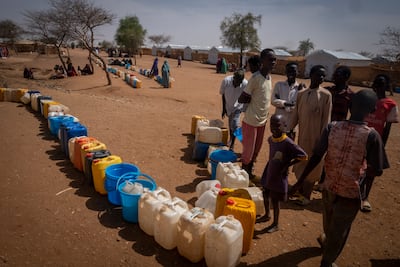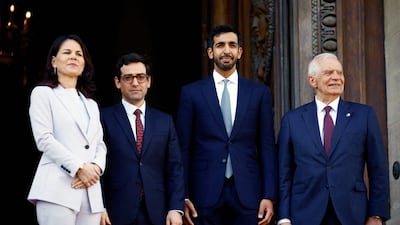Senior European diplomats on Monday described several meditation attempts to end the year-long Sudanese civil war as “ineffective” as officials search for ways to pressure the two warring parties to end the conflict.
The EU, France and Germany are co-hosting a conference for Sudan to raise funds for humanitarian aid. French diplomatic sources said they hope to pledge more than €1 billion. Only 6 per cent of the UN's February $4.1 billion appeal for Sudan and neighbouring countries has been met so far.
"The bloody civil war in Sudan [must] not become a forgotten crisis," German Foreign Minister Annelena Baerbock said.
None of the mediation efforts so far have been fully effective, she told reporters. “Sudan might face a disastrous famine. In a worst-case scenario, one million people might starve this year."
The conference took place as the UK imposed sanctions on three businesses with links to the different factions in Sudan’s civil war.
Companies with links to the Sudanese Armed Forces and the Rapid Support Forces, the two warring parties, will face new limits to their financial freedom a year after fighting began in the north-east African country.
Those facing sanctions include Alkhaleej Bank, which has helped the RSF to finance its operations and control crucial elements of the Sudanese economy, and Al-Fakher Advanced Works, a holding company used by the RSF to export gold. Alkhaleej was put under similar sanctions by the US in January.
Red Rock Mining, a mining and exploration company, which is a subsidiary of Sudan Master Technology and provides funds to the SAF, will also face restrictions.
The EU, Germany and France also wants to increase political pressure on the warring parties to stop fighting and allow more aid in.
“We're leaving too much freedom to the belligerents to procrastinate and bargain because they are dealing with different interlocutors,” Mr Borrell said in Paris.
“We have to step up our efforts. We have to push the belligerents to consider ending hostilities.”
"Sudan is out of time"
An estimated 27 million people – more than half of Sudan's population – need humanitarian aid, with 18 million at high risk of famine, the UN said.
The civil war has also led to the largest displacement crisis in the world, with more than nine million people forced to flee.

Yet the Sudanese war has been eclipsed by other major crises in the world including the wars in Ukraine and Gaza.
"Sudan is out of time ... enough is enough. We need more funds," said Tjada D'Oyen McKenna, the chief executive of Mercy Corps.
The head of emergency response for Medecins Sans Frontieres, Claire Nicolet, said her colleagues in the Sudanese capital Khartoum had been "stuck there for six months".
"No trucks or new staff are able to arrive in Khartoum," she said. MSF is the only international NGO still present in the capital, where millions of people live.
International organisations face difficulties in obtaining travel permits for the war-torn country.
"We don’t just need access, we need safe and secure access," said the WFP director Cindy McCain.
Representatives of a dozen countries were invited for closed-door political talks to try to find solutions to these difficulties before a pledging conference.
A political declaration calling for a ceasefire and the facilitation of humanitarian access is expected to be published at a later stage.
Djibouti's Foreign Minister Mahmoud Ali Youssouf called on opening humanitarian corridors in Sudan supervised by the UN.
"These humanitarian corridors must be secured by light UN units in co-ordination with the countries of the region," he said.
Djibouti currently heads Igad, an intergovernmental trade bloc that has been involved in mediation talks alongside the African Union.
A peace initiative led by the US and Saudi Arabia collapsed shortly after it was signed in Jeddah in May.
Organisers chose to not invite representatives of the warring parties in Sudan.
“It’s above all about humanitarian aid today,” said Ms Baerbock. “It's also our goal to co-ordinate [so] that belligerents cannot play one off against the other.”
Germany pledged an additional €244 million ($260 million), the EU €355 million and France €138 million.
A number of invitees also made pledges, with the UAE and the US announcing $100 million each to support humanitarian efforts in Sudan and neighbouring countries.
"Sudan is at a critical juncture," said the UAE Minister of State Sheikh Shakhboot. "That is why we are calling for a permanent ceasefire."
USAID deputy administrator Isabel Coleman said the US was "gravely concerned" by escalating fighting in the south-west of the country.
The UK, represented at the conference by Richard Benyon, Climate, Environment and Energy Minister, has been holding talks with the RSF as recently as last month, The Guardian reported on Monday.
As diplomats and humanitarian actors highlighted the urgency of addressing the conflict in Paris, skirmishes took place between the army and the RSF in Omdurman, a Nile-side city that is part of the greater capital area, where the army has recently made some battlefield gains.
There were also clashes between the RSF and the army in northern Darfur.

General Mohamed Dagalo, commander of the RSF, addressed the nation on Monday to mark the war’s first anniversary. In a recorded video message posted on his account on X, he blamed the army and supporters of the former dictator Omar Al Bashir for starting the war with concerted attacks on RSF positions in the capital.
“War was never the choice of the Rapid Support Forces … we had no choice except our legitimate right of self-defence,” he said. “Our position has always been and is peace and civilian democratic rule,” he added, accusing the army of opposing the nation’s democratic transition.
Also marking the war’s first anniversary, volunteers fighting with the army against the RSF staged a parade in Shindi, north of the capital, in Nile province.
The Sudanese army and the Rapid Support Forces paramilitary have been engaging in what EU officials have described as “forum shopping”, as a consequence of numerous mediation channels.
European commissioner for humanitarian aid Janez Lenarcic, who co-hosted the Paris conference, said the warring parties had not respected the obligations they committed to in Jeddah.
“There are countries that are close to one or the other side," he said. "We are calling on them to impress upon the two warring parties to respect their international legal obligations as far as international humanitarian law is concerned."





















